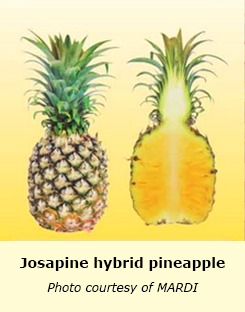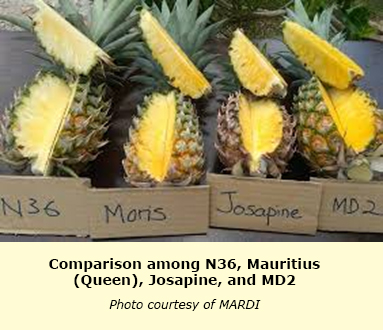[/pullquote]
The global consumption of pineapples continues to grow, due to an increasing demand spurred by demographics, more discerning consumers, cheaper and improved logistics and distribution ecosystem, and rising incomes.
In 2017, Malaysia was ranked 18th in the list of pineapple world producers and 22nd as the world’s pineapple exporter. The traditional export market for fresh and canned pineapples has been mainly to Singapore. Other export destinations are Japan, Hong Kong, Korea, Iran, Qatar, and the United Arab Emirates (UAE). Export value for the fruit has increased 29% from RM 114.2 million (USD 27.32) in 2014 to RM 161 (USD 38. 52) million in 2016 with an estimated volume of 22,000 metric tons annually. The Philippines, Thailand, and Indonesia are the main competitors for Malaysian pineapples in the export market.
In an effort to enhance the export market and to complement current exported varieties such as N36 and MD2 to the Middle East, the Malaysian Pineapple Industry Board (MPIB) has introduced a hybrid called Josapine. The variety, a result of a breeding program by the Malaysian Agricultural Research and Development Institute (MARDI) in 1985, is a hybrid from crossing the Johor (Spanish group) and Sarawak (Smooth Cayenne) varieties.

Josapine has a relatively large fruit (1.5–1.8 kg) with attractive yellow flesh and sweetness of 16%–17% Brix, which has potential for the export market. In terms of postharvest handling, the variety can be harvested within 10 months (110–120 days) with 2–3 weeks of shelf life. Josapine is also tolerant to diseases such as bacterial heart rot and fruit collapse.
In a recent trade mission to Dubai in November 2018, the variety was promoted and evaluated, with assistance from Lulu Hypermarket in Al Barsha. Officials from MARDI, MPIB, and the Malaysian Ministry of Agriculture and Agro-based Industry were also involved in the exercise.
Two pineapple varieties, MD2 and Josapine, were evaluated for preference in terms of color, taste, texture, and aroma. Seventy two percent (72%) of the respondents preferred the MD2 variety, while the rest preferred Josapine. Even though the Josapine variety was less preferred in the evaluation, it is anticipated that the fruit’s favorable attributes together with aggressive promotion can improve its market potential.

Presently, 3–5 exporters are ready to ship Josapine to the Middle East. Negotiations to promote this variety further are ongoing between Malaysian stakeholders and Lulu Group Dubai as distributors. Josapine will be in Lulu’s supermarket by year end for a more comprehensive market trial. It is anticipated that Josapine will be accepted as one of the premium and preferred Malaysian pineapple varieties for the Middle Eastern market.
